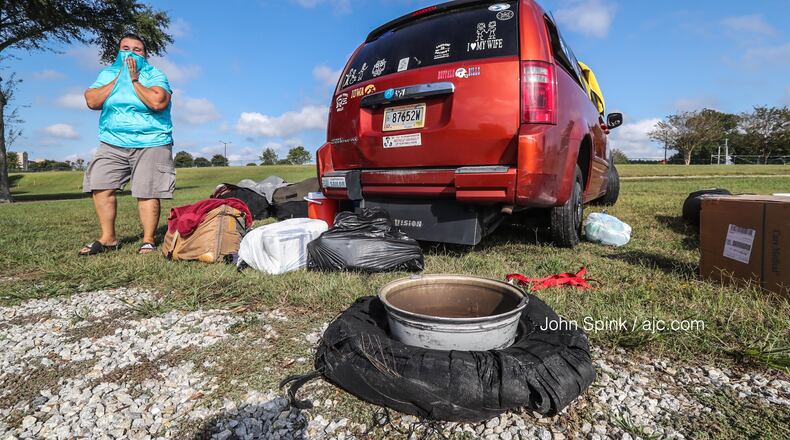As Hurricane Florence hits the coasts of North and South Carolina, some are taking shelter in metro Atlanta, but it’s difficult to gauge just how many have sought refuge here.
Evacuees flocked to Atlanta during Hurricane Irma in 2017, in part because the hurricane was impacting an area stretching from central Florida to south Georgia; Atlanta was just a drive up Interstate 75. Some of those evacuees camped out at Atlanta Motor Speedway in Henry County, occupying about 100 campsites, said Dustin Bixby, the racing facility's vice president of marketing and promotions. The speedway makes free campsites available to evacuees during both hurricanes as a gesture of goodwill, Bixby said.
READ | Metro Atlanta should see less than 1 inch of rain from Hurricane Florence
MORE | First deaths reported from Hurricane Florence
As Hurricane Florence was poised to make landfall in the Carolinas on Thursday evening, only about 16 or 17 campsites were occupied, Bixby said. The closest interstates to areas affected by Hurricane Florence — Charleston and Myrtle Beach in South Carolina and Wilmington and the Outer Banks in North Carolina — don’t easily lead to Atlanta. Interstate 26 out of Charleston goes into the mountains of western North Carolina and Interstate 40 in Wilmington leads to Raleigh.
It’s harder to measure how many of those fleeing Florence have taken refuge in Atlanta-area hotels, said Jim Sprouse, executive director of the Georgia Hotel and Lodging Association. Hotels don’t distinguish between regular guests and those staying because of a hurricane, but rooms in metro Atlanta currently have high occupancy rates, Sprouse said.
Short-term rental platform Airbnb also activated its Open Homes program, allowing people in four states, including Georgia, who normally rent out their homes for a fee to offer free housing for hurricane evacuees.More than 540 hosts in Georgia, South Carolina, North Carolina, Virginia and Tennessee have made their homes available to those in need of shelter, according to spokeswoman Crystal Davis.
Some, like Victoria Croft, are staying with family in Atlanta until the storm passes. Croft grew up in Myrtle Beach and rode out 1989’s Hurricane Hugo in Charleston. Now living near a floodplain in Goose Creek, South Carolina, Croft was not as concerned about the wind and rain as the possibility of days or weeks without power.
“That’s not a good road when you don’t have electricity for two weeks,” Croft said.
Croft made the decision to leave on Tuesday, when she saw some grocery stores were already out of water, bread and milk, and others, including a Walmart store, were closed.
“I’ve never seen a Walmart close before,” Croft said.
Some friends who stuck around in Goose Creek are now worried about running out of food, Croft said, because they didn’t anticipate the storm to stick around this long.
Croft’s parents, who live on the Intracoastal Waterway in Myrtle Beach, decided to stay put, but she hadn’t been able to get into contact with them Friday. She last heard from them Thursday night, after her father had moved his Corvette to a different city and stored his boat and Jet Ski for safety.
“But as far as his life, he left it in Myrtle Beach,” Croft said.
Like AJC on Facebook | Follow us on Twitter
About the Author
Keep Reading
The Latest
Featured

